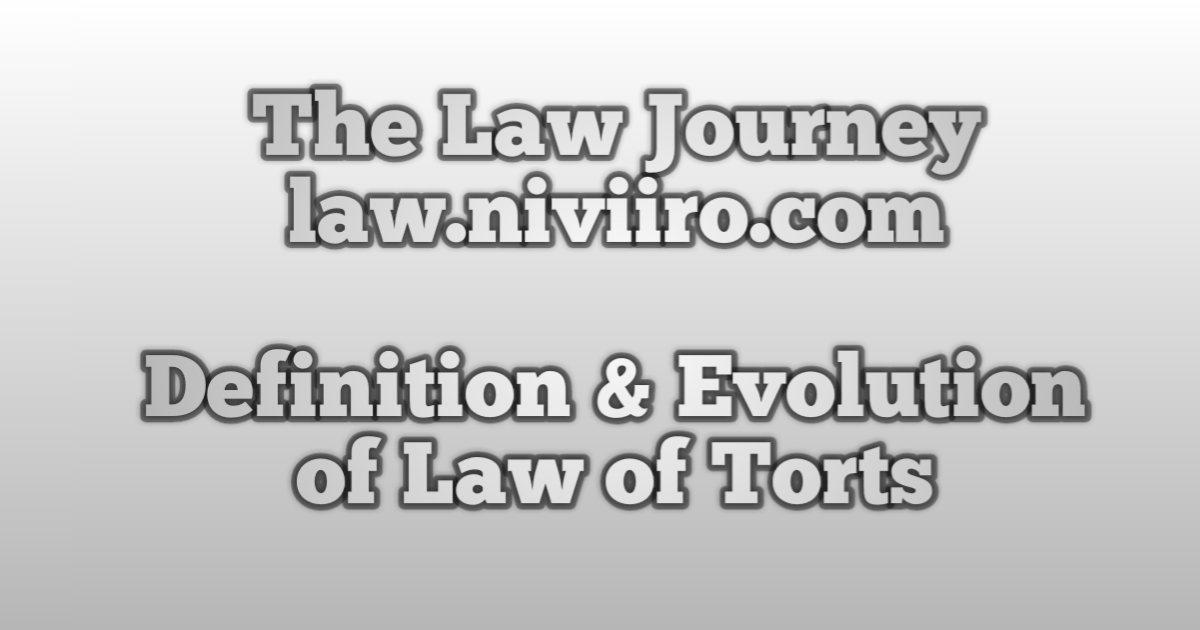Evolution of Law of Torts in England and India
Definition & Evolution of Law of Torts, The essential nature of the law of torts is that it is not codified like statute laws. The law of torts in India is based on English Common law, which is the product of judicial decisions. In Rajkot Municipal Corpn. v Manjulben Jayantilal Nakum (1997) 9 SCC 552, the court observed: “In the absence of statutory law in regard to tortious liability in India, the common law principles evolved in England may be applied in India to the extent of suitability and applicability to the Indian conditions.”
There is very little legislation in the area of tort in India, and, elsewhere in the world. The reason is simple- tortuous liability can arise in a number of ways and the number is so large that it is almost impossible to specify each and every act on the part of the defendant who may be made liable for damages.
In recent times, some parts of the law of torts have been codified, viz. The Workmen’s Compensation Act, The Employer’s Liability Act, etc. Also, laws relating to defamation, libel, etc. have been framed. Unlike England, there is very little tort litigation in India, the reasons being: lack of consciousness about one’s rights and the spirit of toleration, problem of recognition of the action by courts, and, awarding of very low damages. Thus, numerous cases of injury in India like unlawful detention, injury to or the death of people due to adulterated foodstuffs, liquor, medicine, etc., loss due to power cut, noise and other pollutions, etc. are put up without bringing an action in a court of law.
Meaning & Definition of Law of Tort
In common parlance the tort is an injury or wrong independent of implied contract, as by assault, libel, malicious prosecution, negligence, slander or trespass or seduction. The term ‘tort’ is French in origin which is synonym to ‘wrong’ in English version. This word has originated from the Latin word ‘tortus’ which means to twist and implies conduct which is tortious or twisted. The Roman word ‘delict’ and Sanskrit word ‘Jimha’ depict same the meaning. The concept of tort appears when a breach of some duty is caused which is independent of implied contract giving rise to a civil cause of action and for which compensation can be claimed and a damage is recoverable.
Definition of Tort
(Definition & Evolution of Law of Tort) Many authors have defined the term ‘tort’ but so far, its definition is still in a growing stage and it would be difficult to accept any single definition which could define tort in wholesome manner. There are shortcomings in each of the definitions but we will try here to find those missing links and bridging the gaps with our own suggestions.
A workable definition of tort may be as:-A civil wrong which is independent of implied contract for which the appropriate remedy is an action for unliquidated damages.
- Clerk and Lindsell ‘A tort may be described as wrong independent of contract, for which the appropriate remedy is common law action’.
- Salmond and Heuston A tort is a ‘civil wrong for which the remedy is a common law action for unliquidated damages, and which is not exclusively the breach of a contract or the breach of a trust or other merely equitable obligation.
- Winfield “Tortious liability arises from the breach of a duty primarily fixed by the law: this duty is towards persons generally and its breach is redressible by an action for unliquidated damages.”
- Sir Fredrick Pollock ‘The law of torts in civil wrongs is a collective name for the rules governing many species of liability which, although their subject-matter is wide and varied, have certain broad features in common, are enforced by the same kind of legal process and are subject to similar exceptions.
Related Post
What do you mean by law of torts ?
A civil wrong which is independent of implied contract for which the appropriate remedy is an action for unliquidated damages.
Define law of torts ?
Salmond and Heuston A tort is a ‘civil wrong for which the remedy is a common law action for unliquidated damages, and which is not exclusively the breach of a contract or the breach of a trust or other merely equitable obligation.
Winfield “Tortious liability arises from the breach of a duty primarily fixed by the law: this duty is towards persons generally and its breach is redressible by an action for unliquidated damages.”
References
- Universal’s Law of Torts
- A K. Jain law of torts
- Law of Torts by RK Bangia (22nd Edition)
- Ratanlal and Dhirajlal’s Law of Tort book

















